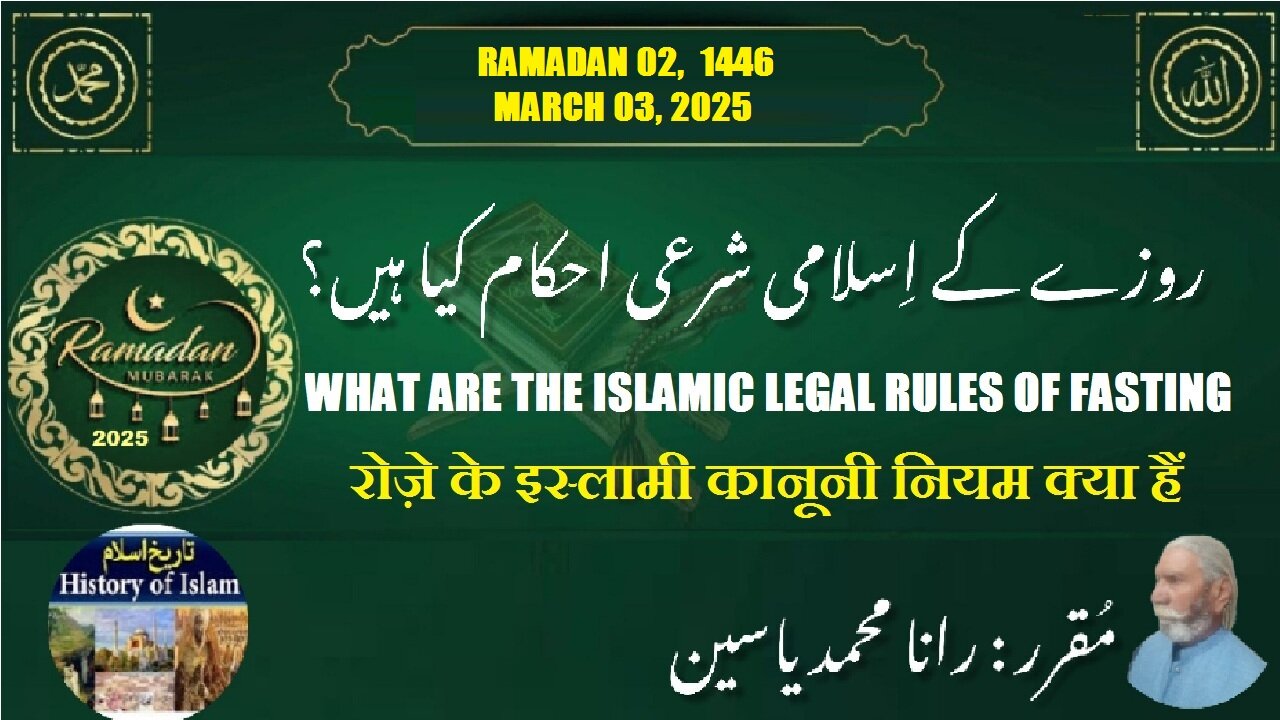Premium Only Content

Legal Rules of Fasting रोज़े के इस्लामी कानूनी नियम क्या हैं روزے کے اسلامی شرعی احکام کیا ہیں؟
@islamichistory813 #ramadan2025 #islamic #fasting #ramadan #legalrules #fastinginislam #spiritualguidance #ramadanrules
What are the Islamic Legal Rules of Fasting
Asslamoalaikum sisters brothers and elders, this islamic informatic video will offers a thorough examination of the Islamic legal rules related to fasting, highlighting the importance of this practice in the lives of Muslims. We will describe the various conditions that must be met for fasting to be valid, the exceptions for those who are unable to fast, and the spiritual benefits associated with this act of devotion. So be with us upto end of this video in to enhance your knowledge and appreciation of the rules that guide fasting in Islam.
The Arabic word for fasting is called "sawm" in the Quran. The word sawm literally means "to abstain". Chapter Maryam of the Quran says that Mary the mother of Jesus said "I have vowed a "sawm" (fast) for the sake of the Merciful, so today I shall not speak to anyone." [Quran 19:26]. According to Shariyah, the word sawm means to abstain from all those things that are forbidden during fasting from the break of dawn to the sunset, and to do this with the intention of fasting.
In chapter 2 verse 183 the Quran says, "O you who believe, fasting is prescribed for you as it was prescribed for those who were before you, in order that you may learn taqwa (piety)".
Taqwa is a very important spiritual and ethical term of the Quran. It is the sum total of all Islamic spirituality and ethics. It is a quality in a believer's life that keeps him or her aware of God all the time. A person who has taqwa loves to do good and avoid evil for the sake of God. Taqwa is piety, righteousness and consciousness of God. Taqwa requires patience and perseverance. Fasting teaches patience, and with patience one can rise to the high position of taqwa.
The Prophet (SA) said that fasting is a shield. It protects a person from sin and lustful desires. When the disciples of Jesus asked him how to cast the evil spirits away, he is reported to have said, "But this kind never comes out except by prayer and fasting." (Matthew 17:21).
According to Imam Al Ghazali, fasting produces a semblance of divine quality of samadiyyah (freedom from want) in a human being. Imam Ibn Al Qayyim, viewed fasting as a means of releasing the human spirit from the clutches of desire, thus allowing moderation to prevail in the carnal self. Imam Shah Waliullah Dahlawi (d. 1762 C.E.) viewed fasting as a means of weakening the bestial and reinforcing the angelic elements in human beings. Maulana Mawdudi (d. 1979 C.E.) emphasized that fasting for a full month every year trains a person individually, and the Muslim community as a whole, in piety and self restraint.
In the second year of Hijrah, Muslims were commanded to fast in the month of Ramadan every year as mentioned in the verse above [Al-Baqarah 2:183]. The Quran further says "The month of Ramadan is that in which was revealed the Quran, wherein is guidance for humankind and the clear signs of guidance and distinction. Thus whosoever among you witness the month must fast..." [Al-Baqarah 2:184].
Prophet Muhammad (SA) explained this further in a number of his statements reported in the books of Hadith. It is reported by Imam Al-Bukhari and Imam Muslim on the authority of Ibn Umar that the Messenger of God said, "Islam is built upon five pillars: testifying that there is no god except God and that Muhammad is the Messenger of God, performing Prayer, paying the zakah, making the pilgrimage to the Sacred House (Hajj), and fasting during the month of Ramadan."
The entire Muslim world is unanimous in the principal of fasting in the month of Ramadan and considers it obligatory upon every person who is physicaly capable (mukallaf).
Muslims all over the world wait eagerly for Ramadan, as it is a time of increased inner peace and well-being.
Fasting in the month of Ramadan is obligatory upon every adult Muslim, male or female, who has reached puberty, is sane and who is not sick or traveling.
Sickness could be a temporary sickness from which a person expects to be cured soon. Such a person should not fast during the days of his or her sickness, but he or she must fast later after Ramadan to complete the missed days. Those who are sick with incurable illness and expect no better health are also allowed not to fast but they must pay the fidyah, which is giving a day's meals for each fast missed to a needy person. Instead of food for one day one can also give equivalent amount of money to a needy person. Women in their menses and post-natal bleeding are not allowed to fast, but they must make up the fast later after Ramadan. If pregnant women and mothers who are nursing babies can also postpone their fasting to a later time when they are able to do so.
A travel according to the Shariah is any journey that takes you away from your city of residence, a minimum of 48 miles or 80 kilometers. The journey must be for a good cause. One must avoid frivolous travel during Ramadan which causes a person to miss fasting. If possible one should try to change their travel plans during Ramadan to be able to fast and should not travel unless it is necessary. The traveler who misses the fasts of Ramadan must make up those missed days later as soon as possible after Ramadan.
Allah Hafiz
=============================
-
 1:17
1:17
ISLAMIC HISTORY
1 hour agoSurah At Taubah Verse No 62 تلاوت َسورة اَلتَّوْبَة اردو اور انگریزی ترجمے کے ساتھ آیت نمبر
1 -
 LIVE
LIVE
SpartakusLIVE
2 hours ago#1 Verdansk Sniper gets HACCUSATIONS because of INSANE Headshots
195 watching -
 18:52
18:52
Colion Noir
8 hours agoCourt Rules You Don't Need AR-15s For Self Defense, Mayor's Message If You Love Kids Ban AR-15s
19.3K46 -
 1:56:25
1:56:25
Nerdrotic
4 hours ago $6.66 earnedThe Mysteries of Mars and the Moon with Mike Bara | Forbidden Frontier #114
20.7K6 -
 1:11:31
1:11:31
The Mel K Show
3 hours agoMel K & Chas Holloway | An Opposing Theory: The AI & Tyranny Question | 8-31-25
18K4 -
 LIVE
LIVE
Rallied
3 hours ago $1.58 earnedSolo Challenges All Day
161 watching -
 LIVE
LIVE
IsaiahLCarter
2 days ago $0.57 earnedGrandmasters and Heretics || APOSTATE RADIO #027
64 watching -
 3:03:40
3:03:40
Barry Cunningham
8 hours agoPRESIDENT TRUMP IS THE TROLLER-IN-CHIEF AND MORE BREAKING NEWS!
40.7K35 -
 13:07
13:07
Robbi On The Record
5 hours ago $3.11 earnedSweet Poison: The Big Fat Lie That’s Killing America
25.1K10 -
 1:00:09
1:00:09
Sarah Westall
4 hours agoFlorida Surgeon General: Operation Warp Speed plus Attacks on RFK Jr w/ Dr Ladapo
25.4K11